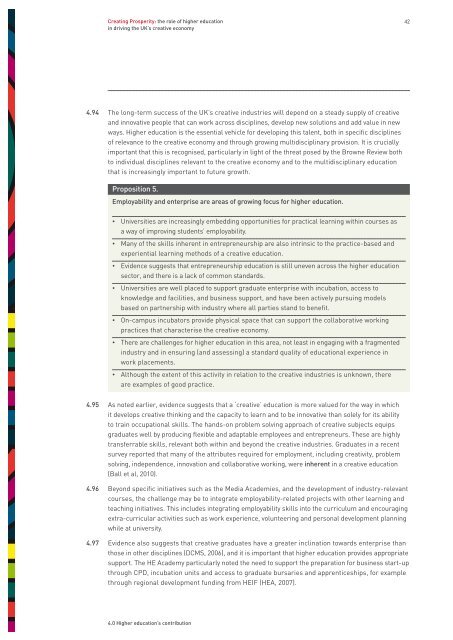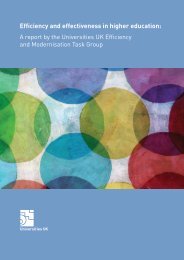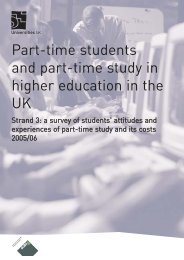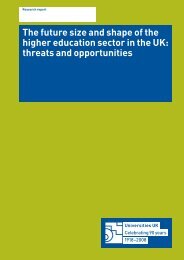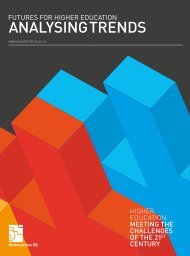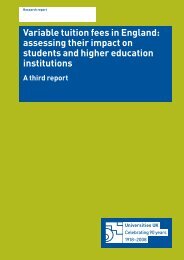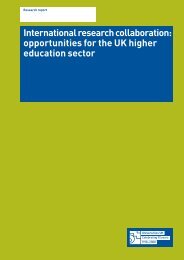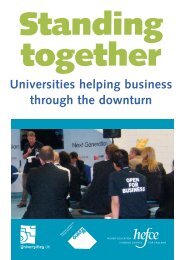Creating Prosperity: the role of higher education in ... - Universities UK
Creating Prosperity: the role of higher education in ... - Universities UK
Creating Prosperity: the role of higher education in ... - Universities UK
You also want an ePaper? Increase the reach of your titles
YUMPU automatically turns print PDFs into web optimized ePapers that Google loves.
<strong>Creat<strong>in</strong>g</strong> <strong>Prosperity</strong>: <strong>the</strong> <strong>role</strong> <strong>of</strong> <strong>higher</strong> <strong>education</strong><strong>in</strong> driv<strong>in</strong>g <strong>the</strong> <strong>UK</strong>’s creative economy424.94 The long-term success <strong>of</strong> <strong>the</strong> <strong>UK</strong>’s creative <strong>in</strong>dustries will depend on a steady supply <strong>of</strong> creativeand <strong>in</strong>novative people that can work across discipl<strong>in</strong>es, develop new solutions and add value <strong>in</strong> newways. Higher <strong>education</strong> is <strong>the</strong> essential vehicle for develop<strong>in</strong>g this talent, both <strong>in</strong> specific discipl<strong>in</strong>es<strong>of</strong> relevance to <strong>the</strong> creative economy and through grow<strong>in</strong>g multidiscipl<strong>in</strong>ary provision. It is cruciallyimportant that this is recognised, particularly <strong>in</strong> light <strong>of</strong> <strong>the</strong> threat posed by <strong>the</strong> Browne Review bothto <strong>in</strong>dividual discipl<strong>in</strong>es relevant to <strong>the</strong> creative economy and to <strong>the</strong> multidiscipl<strong>in</strong>ary <strong>education</strong>that is <strong>in</strong>creas<strong>in</strong>gly important to future growth.Proposition 5.Employability and enterprise are areas <strong>of</strong> grow<strong>in</strong>g focus for <strong>higher</strong> <strong>education</strong>.• <strong>Universities</strong> are <strong>in</strong>creas<strong>in</strong>gly embedd<strong>in</strong>g opportunities for practical learn<strong>in</strong>g with<strong>in</strong> courses asa way <strong>of</strong> improv<strong>in</strong>g students’ employability.• Many <strong>of</strong> <strong>the</strong> skills <strong>in</strong>herent <strong>in</strong> entrepreneurship are also <strong>in</strong>tr<strong>in</strong>sic to <strong>the</strong> practice-based andexperiential learn<strong>in</strong>g methods <strong>of</strong> a creative <strong>education</strong>.• Evidence suggests that entrepreneurship <strong>education</strong> is still uneven across <strong>the</strong> <strong>higher</strong> <strong>education</strong>sector, and <strong>the</strong>re is a lack <strong>of</strong> common standards.• <strong>Universities</strong> are well placed to support graduate enterprise with <strong>in</strong>cubation, access toknowledge and facilities, and bus<strong>in</strong>ess support, and have been actively pursu<strong>in</strong>g modelsbased on partnership with <strong>in</strong>dustry where all parties stand to benefit.• On-campus <strong>in</strong>cubators provide physical space that can support <strong>the</strong> collaborative work<strong>in</strong>gpractices that characterise <strong>the</strong> creative economy.• There are challenges for <strong>higher</strong> <strong>education</strong> <strong>in</strong> this area, not least <strong>in</strong> engag<strong>in</strong>g with a fragmented<strong>in</strong>dustry and <strong>in</strong> ensur<strong>in</strong>g (and assess<strong>in</strong>g) a standard quality <strong>of</strong> <strong>education</strong>al experience <strong>in</strong>work placements.• Although <strong>the</strong> extent <strong>of</strong> this activity <strong>in</strong> relation to <strong>the</strong> creative <strong>in</strong>dustries is unknown, <strong>the</strong>reare examples <strong>of</strong> good practice.4.95 As noted earlier, evidence suggests that a ‘creative’ <strong>education</strong> is more valued for <strong>the</strong> way <strong>in</strong> whichit develops creative th<strong>in</strong>k<strong>in</strong>g and <strong>the</strong> capacity to learn and to be <strong>in</strong>novative than solely for its abilityto tra<strong>in</strong> occupational skills. The hands-on problem solv<strong>in</strong>g approach <strong>of</strong> creative subjects equipsgraduates well by produc<strong>in</strong>g flexible and adaptable employees and entrepreneurs. These are highlytransferrable skills, relevant both with<strong>in</strong> and beyond <strong>the</strong> creative <strong>in</strong>dustries. Graduates <strong>in</strong> a recentsurvey reported that many <strong>of</strong> <strong>the</strong> attributes required for employment, <strong>in</strong>clud<strong>in</strong>g creativity, problemsolv<strong>in</strong>g, <strong>in</strong>dependence, <strong>in</strong>novation and collaborative work<strong>in</strong>g, were <strong>in</strong>herent <strong>in</strong> a creative <strong>education</strong>(Ball et al, 2010).4.96 Beyond specific <strong>in</strong>itiatives such as <strong>the</strong> Media Academies, and <strong>the</strong> development <strong>of</strong> <strong>in</strong>dustry-relevantcourses, <strong>the</strong> challenge may be to <strong>in</strong>tegrate employability-related projects with o<strong>the</strong>r learn<strong>in</strong>g andteach<strong>in</strong>g <strong>in</strong>itiatives. This <strong>in</strong>cludes <strong>in</strong>tegrat<strong>in</strong>g employability skills <strong>in</strong>to <strong>the</strong> curriculum and encourag<strong>in</strong>gextra-curricular activities such as work experience, volunteer<strong>in</strong>g and personal development plann<strong>in</strong>gwhile at university.4.97 Evidence also suggests that creative graduates have a greater <strong>in</strong>cl<strong>in</strong>ation towards enterprise thanthose <strong>in</strong> o<strong>the</strong>r discipl<strong>in</strong>es (DCMS, 2006), and it is important that <strong>higher</strong> <strong>education</strong> provides appropriatesupport. The HE Academy particularly noted <strong>the</strong> need to support <strong>the</strong> preparation for bus<strong>in</strong>ess start-upthrough CPD, <strong>in</strong>cubation units and access to graduate bursaries and apprenticeships, for examplethrough regional development fund<strong>in</strong>g from HEIF (HEA, 2007).4.0 Higher <strong>education</strong>’s contribution


